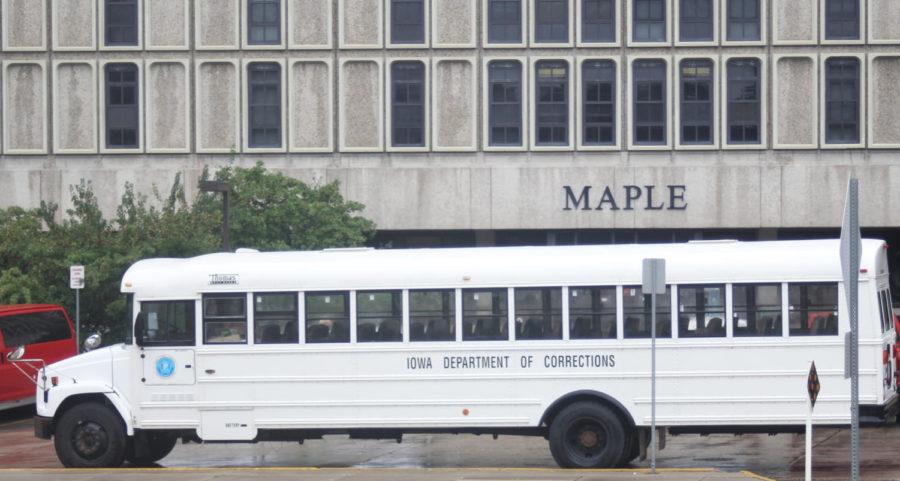Inmates install dorm furniture
By Matthew Rezab, [email protected]
An Iowa Department of Corrections bus sits empty in front of Maple Hall on July 28, 2015, as inmates inside the residence hall move and install furniture.
August 4, 2015
Students living in housing provided by Iowa State use their furniture to sit, study, eat and sleep every day, but they’re probably unaware it was built, moved and even installed by Iowa prisoners.
Since 1999, Iowa State has partnered with Iowa Prison Industries and the Iowa Department of Corrections to provide furniture, cleaning products and labor services needed at the university.
Director of Residence Pete Englin said all three regent institutions buy furniture from IPI. The inmates are working as participants in IPI’s reentry program.
“I think it actually started with us in Maple [in 1999] when they were looking at furniture styles,” Englin said. “We’re encouraged to partner with other state agencies, and the fact we can help support one state agency and partner that way, encouraged us to look at ways they could help us.”
IPI Director Dan Clark said all inmates allowed to work on campus have been screened for original offenses. Prisoners convicted of violent crimes or sexual offenses are not allowed to participate, he said.
“These are all minimum security inmates that are allowed to work outside the prison walls,” Clark said. “They work at Iowa State, they work at the governor’s mansion, they work at our office here in Des Moines, they do all kinds of different jobs.”
Englin said an attractive part of the collaboration was that delivery and installation is part of the original purchasing price. In 2014, Iowa State paid $1,119,704 for 536 sets of furniture in Willow Hall. In 2015, $1,119,168 was spent for 536 sets in Larch Hall and $791,720 for 395 sets in off-campus housing.
Inmates are never allowed to work in occupied buildings and safety is always the department’s first priority, Englin said.
Inmates also visit campus for non-installation purposes. When Iowa State hosts large events in the summer, IPI can send crews for other tasks.
“We have lofted furniture but during the summer we also host Iowa Special Olympics,” Englin said. “Lofted furniture does not work. So after the students are out and the buildings are unoccupied, they’ll come in and help us move all those beds onto the floor.
“We have a long standing relationship with [IPI] and a lot of trust has been developed. They’re heavily supervised and the folks who get to come to campus earn the right. It’s a privilege to be able to get out and go do this.”
Clark echoed Englin and said the reentry program helps the 500-700 inmates at eight Iowa correctional facilities integrate back into society after their release. According to IPI’s 2014 Annual Report, recitivism rates in Iowa have dropped from 36.5 percent in 2009 to 29.7 percent in 2014.
“Honestly, we have very few problems,” Clark said. “These are well behaved offenders that have shown they can handle this level of supervision. It’s a good program for them, they’re about to be released. They’re at their last step of incarceration.”
Because the program is government sponsored, any profit made must be redistributed into the system, Clark said.
“If we have more income than expenses in a given year, we’re allowed to roll that over, but in the end it just gets invested in new programs, new equipment and new trucks,” he said.
According to the 2014 report, IPI made $28.8 million in sales and logged more than 900,000 training hours for inmates. That allowed IPI’s operation to return $1.7 million to the DOC institutions and Iowa’s General Fund.
DOR Purchasing Coordinator Roger Sebring said most prisoners allowed to work on campus are from correctional facilities in Rockwell City and Newton.
Sebring said the quality and durability of the product is what set IPI apart from competitors.
“When new furniture was purchased for Maple, we took the furniture from Maple out to the towers and it’s still there,” Sebring said.
He also said the furniture for the “Buchanan Two” residence hall will also be purchased from IPI.
“When you’re trying to furnish for 12,000 students, this has actually worked out very well,” Englin said.







